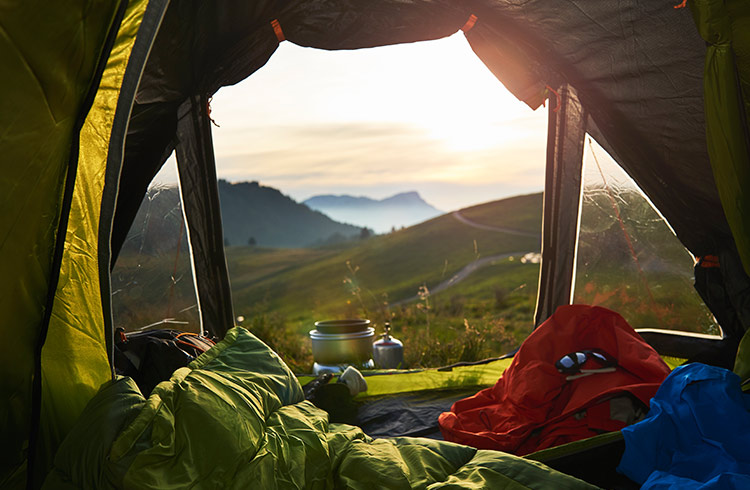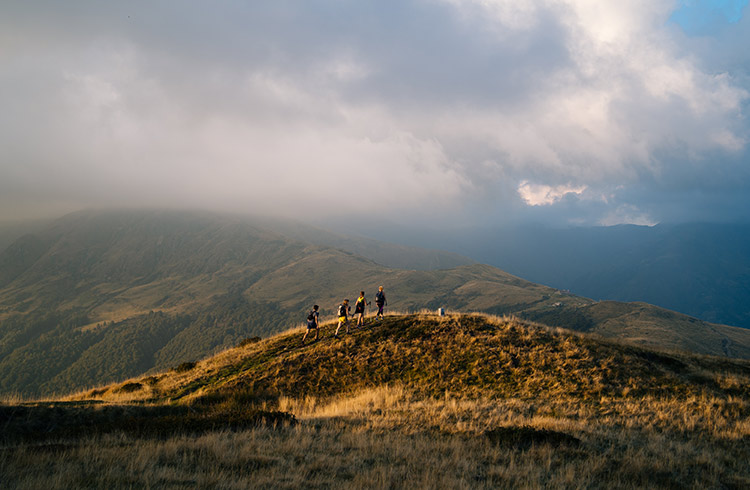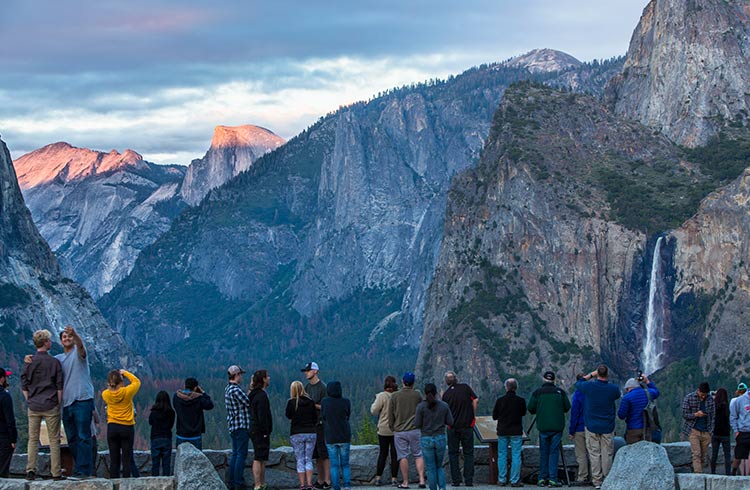9 Essential Tips To Leave No Trace When You Travel
Take special care when you’re camping, hiking, snorkeling or snowshoeing – whether traveling close to home or around the world
 Photo © Getty Images / Ross Woodhall
Photo © Getty Images / Ross Woodhall
Before heading into the great outdoors, whether you're traveling within your own country or further afield, the first step is to take care of the basics: bring a plastic bag to collect your trash and have a plan in place for how you’ll go to the bathroom if a location lacks facilities.
When possible, use gear you already own or purchase second-hand. If you need to purchase new equipment for a trip, invest in well-made gear that will last a long time. Patagonia, Osprey, and REI make high-quality gear and REI even runs a second-hand gear program to help extend the life of its products.
One of the best things we can do to for the environment is to give nature a break and avoid heavily trafficked areas and over-touristed destinations. Instead of stepping on already over-trampled paths and parks, look into less-traveled terrain that hasn’t yet been discovered by Instagram influencers. Even better, plan your visit during off-peak season, when you’ll encounter even fewer travelers on the trails.
- Rules and regulations
- Hiking
- Camping
- Skiing and snowshoeing
- Snorkeling and scuba diving
- Preserving pristine areas
- Waste management
- Poop like a pro
- Choosing a responsible tour operator
Rules and regulations
In addition to standard outdoor instructions like ‘don’t feed wildlife’, destination-specific restrictions may stipulate no hiking after a certain hour, no drone use, no swimming in hot springs, or no dogs allowed on trails. Yellowstone National Park even requires that side mirrors be detached when a vehicle is not pulling a trailer.
Not only do these instructions provide important rules and regulations, but they also typically include information about where to find safe drinking water, restrooms, and first aid facilities. When you get to a protected park or wildlife area, visit the information center, where you can review regulations and the most recent updates on fire danger ratings and closed trails and campgrounds.
Permits may be required for some routes and hikers may be required to watch safety videos or confirm sufficient wilderness knowledge before entering wild areas. These permits are not suggested, they’re mandatory, as they help ensure the safety of hikers, wildlife, and the ecosystem.
Hiking
Hiking allows us to experience nature on a more personal level so you may be tempted to skip the main trail and ‘forge your own path’. Keep in mind that getting off-the-beaten path figuratively doesn’t mean that you should be wandering off the path literally. Trails exist for a reason and responsible travelers should stay on designated trails to avoid getting lost or damaging the surrounding environment. If everyone went their own way, the forest would become a trampled web of mini trails.
It should go without saying that any trash that’s brought in should be taken out. It’s possible to hike long distances before coming across a park-managed garbage bin so consider how the products you bring in could reduce the amount of trash you’ll need to carry out. Opt for lightweight silicone dishes, bamboo cutlery, and handheld water filters like Grayl or Lifestraw.
Camping
Though loud, crowded campsites may not be ideal, they may be your only option if you’re camping within popular national parks during peak season. Tents can disturb vegetation and animal habitats the same way that hiking off-trail does so if you’re in a campsite, stay within the designated camp area. If you’re wild camping, be sure to move your tent every few days so the grass underneath can recover.
If you’re going to cook while camping, use existing fire pits, keep the area free of flammable debris, and only use dead branches or wood that have fallen to the ground on its own. Never chop down healthy trees for firewood. Respect fire danger warnings and note that some parks may not allow fires during dry summer months. Parks Canada also discourages visitors from bringing their own firewood from home, as doing so can “inadvertently introduce invasive species and have lasting impacts on the landscape.”
If you have dishes to wash, use a bucket to bring water to your campsite. Never wash dishes – or clothing – in the water source. Even the most eco-friendly, biodegradable soaps weren’t intended to be poured directly into lakes and streams.
Skiing and snowshoeing
Skiers, snowshoers, and winter hikers should follow the same principles as warmer-weather trekkers: stick to approved areas, follow the rules, and take out what you bring in. The snow may hide garbage in the winter, but it will melt eventually.
During winter months, many areas have designated trails specific to skiers, snowshoers, and hikers. According to Timothy Carlson, Wilderness Emergency Medical Technician and former hiking guide, this is as much of a safety measure, as it is a convenience factor. “Skis can get caught on dips created by snowshoers’ tracks, causing accidents.” He suggests that each group sticks to its own tracks and study maps and guidebooks before heading out to ensure they’re traveling on the right trails.
Jenn Coleman of Coleman Concierge, who served as a ski patroller in class A avalanche areas, skiers and snowshoers should travel in pairs or groups and leave an itinerary with family or friends. According to Coleman, “You put the lives of first responders in jeopardy when you act irresponsibly.” At a minimum, he suggests carrying and knowing how to use an avalanche beacon (that can be used to help rescuers locate you), a probe, and a shovel. She advises anyone heading into the backcountry in winter to take an avalanche preparedness class.
Snorkeling and scuba diving
According to Danny Rivera, a dive instructor at Good Life Divers, being a responsible diver starts well before the actual dive. “Check reviews of the operators to make sure they use best practices to limit the impact of their operation on the environment, wildlife, and underwater landscape.” Green Fins members pledge to adhere to a strict environmental code of conduct that includes participating in coral reef monitoring and ocean clean-ups.
Ask operators if dive sites are accessible by swimming from the beach to avoid polluting the water with boat fuel. Once on the dive, wear reef-safe sunscreen and avoid contact with the bottom and with sensitive corals. Rivera suggests not wearing gloves unless they’re needed for thermal protection, as they promote the touching of marine life and coral.
Preserving pristine areas
When exploring pristine natural areas like Antarctica and Patagonia, it’s especially important to avoid taking souvenirs or contaminating the environment with foreign seeds. In many countries, it’s illegal to collect plants, flowers, berries, mushrooms, animals, animal parts (such as antlers), rocks, fossils, driftwood, signs, or any other natural or historic object. If you believe you have found something significant, leave it where it is and report it to the nearest authority.
Waste management
Though it may seem harmless to toss a banana peel into the bushes, if that ‘organic waste’ isn’t native to the area, it could be considered an invasive species and, over time, alter the local ecology. In some areas, organic waste could attract the attention of animals, who may become reliant on scavenging instead of doing what they normally do, gathering their own food.
Poop like a pro
While we’re on the topic of waste management, consider how the good ol’ ‘leave no trace’ adage also refers to human waste. Packing your waste to carry out with you is the best option (odor-neutralizing ‘go anywhere’ poop bags are even a thing).
If you didn’t pack proper poop paraphernalia, your next best bet is digging a 6-8 inch (15-20cm) ‘cathole’ at least 200 feet (60m) from your camp and any trails or water sources. Be sure to carry out all used toilet paper with you, which can easily be stored in a low-tech, re-sealable plastic bag. Should a man’s best friend be joining you on a hike, pack up his/her poop to carry out as well.
Choosing a responsible tour operator
Look for locally owned tour companies that pay and treat their employees well (for instance, limiting the amount of weight porters can carry) and who have solid sustainability guidelines. If a company’s sustainability policies aren’t visible on its website, ask for examples of how they’re reducing their impact on the environment.
If group tours aren’t your thing but you still want to explore with an expert, hire a local guide who knows the area well and can take you to less-traversed routes that are safe to explore.
Related articles
Simple and flexible travel insurance
You can buy at home or while traveling, and claim online from anywhere in the world. With 150+ adventure activities covered and 24/7 emergency assistance.
Get a quote


No Comments